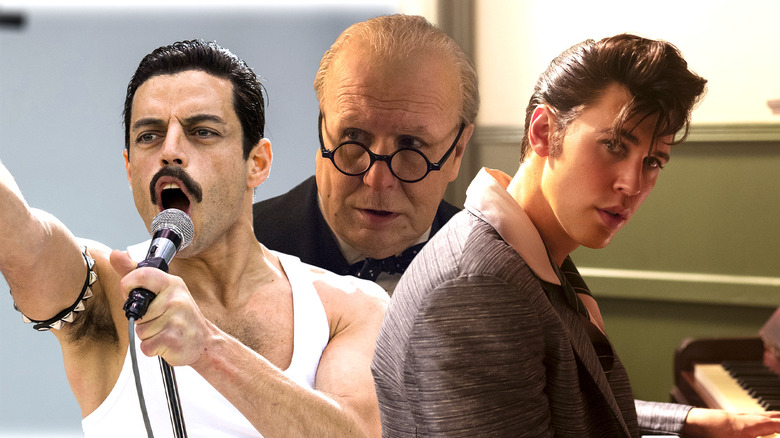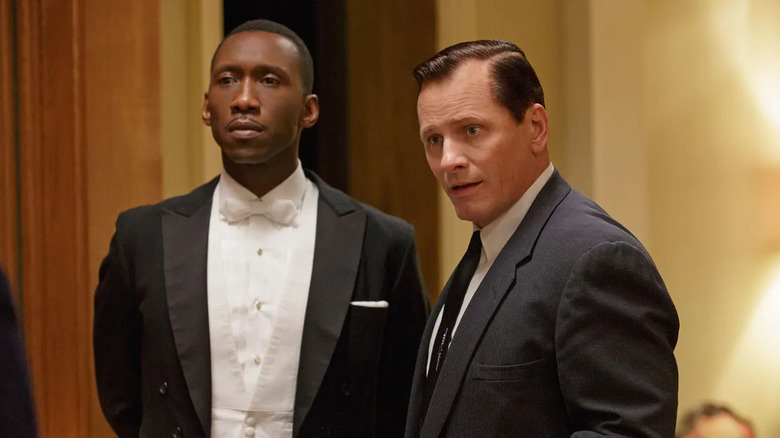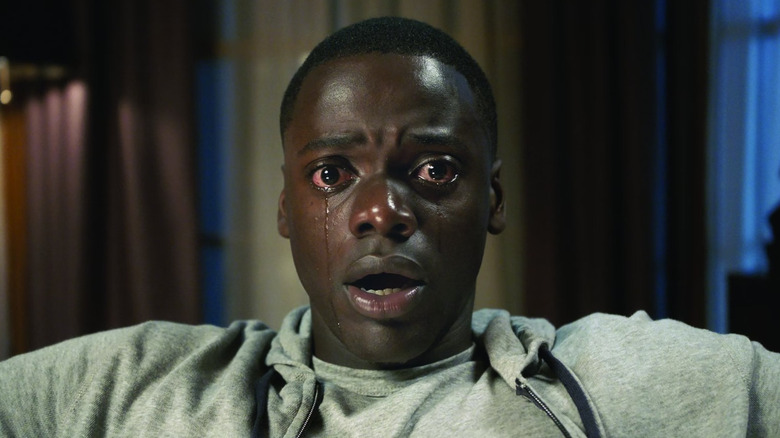The Oscars Need To Lose Their Obsession With Biopics (And Stop Rewarding Extended SNL Impersonations)
The Academy of Motion Picture Arts and Science is, ostensibly, the last word in excellence in film, and every year, they try to remind the public of that fact by, well, rewarding what they decide are excellent films and performances. But are they always right? Do they have a decent track record of choosing the right movies and performances?
In short? No. The Academy is constantly and routinely mocked and attacked for utterly boneheaded choices. Movies like "Crash" and "Green Book," which both controversially won Best Picture over fellow nominees like "Brokeback Mountain" and "BlacKkKlansman" in 2006 and 2019, respectively, have since been crapped on enough that it's genuinely embarrassing that they were chosen in the first place. With this in mind, you can safely take the Academy's decision with a large grain or maybe even a full block of salt, but there's another stupid trend they insist on continuing that needs to just end already.
The Oscars just love themselves a good biopic — especially ones about real people in the entertainment industry or politics (its own form of theater, honestly). Is this a good thing, though? At the risk of repeating ourselves: no, it's not. Playing a real-life figure is basically a fast-track to winning an Oscar, and to be perfectly blunt, that just sucks. The Oscars need to calm down about biopics and stop handing out automatic awards to anyone brave enough to play a famous singer or prime minister — and here's the kind of acting they should highlight instead.
Playing a real-life person isn't as impressive as the Oscars think it is
Year after year, we're supposed to be blown away that an actor studied a real-life person's history and then "transformed" into them. Austin Butler lightly ruined his life for "Elvis." Gary Oldman gave himself nicotine poisoning for "Darkest Hour" and dressed up like Fat Bastard from "Goldmember." Rami Malek talked over the largest fake teeth in cinematic history. Great! Good for them. Why does it trump any other actor's process, though?
Butler, as of this writing, still could potentially win the Oscar for his performance as Elvis Presley. Malek and Oldman both beat out extremely competitive fields to win in their respective years. Realistically, though, neither Oldman or Malek delivered the performance of the year, but the narrative around those performances and the fact that they had to "embody" these figures pushed them over the edge. Ultimately, the fact is that both of those performers in particular just did "Saturday Night Live" impressions for like, two plus hours. That's it. More people should just be honest about it. It takes talent, yes, but if Oldman and Malek really deserved their Oscars, then Maya Rudolph should be swimming in Emmys for her "Beyoncé on Hot Ones" sketch alone.
Biopics are a repetitive genre that often get basic facts wrong
Actors always get a ton of attention for making the daring choice to be in a biopic, but another important thing to consider here is that biopics, as a genre, are beyond tired. Every biopic hits exactly the same beats when all is said and done, especially when it comes to musicians, which is why parodies like "Walk Hard" and "Popstar: Never Stop Never Stopping" end up outshining their much more serious counterparts. (It has been pointed out, countless times on the world wide web, that "Walk the Line," where Joaquin Phoenix plays Johnny Cash, is just "Walk Hard" without any jokes in it.)
There's also been plenty of instances of biopics getting basic details wrong, to add insult to injury — and they often change those details on purpose so the narrative is a little more "exciting." Alan Turing's story as told in "The Imitation Game" is largely incorrect: not only was he not bullied over being queer, but even the way the film depicts his successes with the Turing machine is kind of mangled. Inaccuracies also appear in "Bohemian Rhapsody," for which Rami Malek won an Oscar for playing Freddie Mercury, as the film weirdly and pointedly glosses over Mercury's diagnosis as HIV positive and paints a narrative about him using his illness to reunite Queen. "Green Book," one of the most divisive Oscar-bait movies in recent memory, was so factually sketchy that Mahershala Ali, who won his second Oscar for playing musician Don Shirley in the film, ultimately apologized to the real Shirley's family for his performance. If you have to sensationalize a real person's history for a more sensational film, then that invites a big question: why don't you just make up a different, more sensational story?
Creating a character from whole cloth is a real acting challenge
You know what's a real acting challenge for brilliant performers to sink their teeth into? Creating a totally new character and making them feel like a lived-in, real person with their own story. If we're going to talk about the Oldman of it all, let's look at one of his fellow nominees: Daniel Kaluuya, who blew audiences and critics away with his grounding performance in "Get Out."
Kaluuya is an undeniable powerhouse in "Get Out" — without him at the center of it, this incredible, high-concept film might collapse under its own weight. If you think back on recent movie history, there are few shots as iconic as him sitting trapped in an armchair, that one tear snaking down his face, eyes wide. Beyond that, despite not knowing a ton about his character Chris at the outset, it's easy to fill in the blanks, and he feels like a real living, breathing person. Did Kaluuya win an Academy Award for this game-changing role, which is burned into pop culture memory forever? No. He won for playing real-life activist Fred Hampton a few years later in "Judas and the Black Messiah."
At the 2022 Oscars, three out of the five Best Actress and Actor nominees were based on real people, and both winners — Jessica Chastain and Will Smith — were among them. That's so boring. This year, only one of each is based on a famous person — and while we don't want to root against Austin Butler or Ana de Armas, it feels more richly deserved to reward someone who created a person who feels so real using just words on a page.



